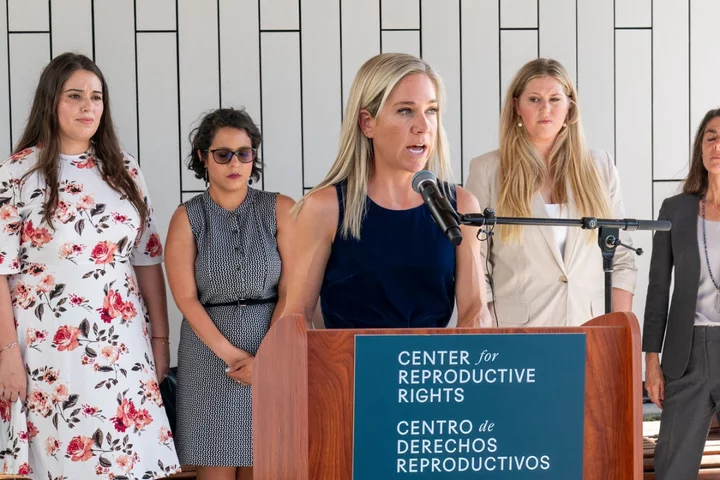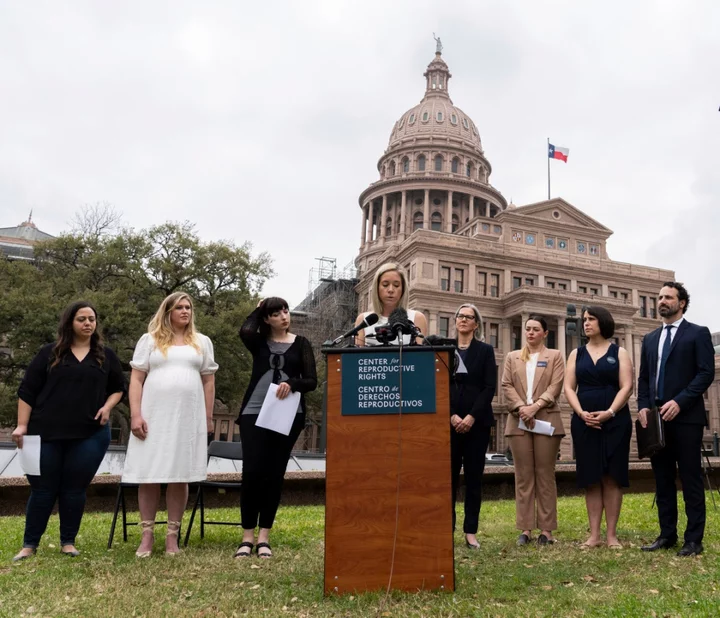
Trump goes on kooky rant about how long it takes to wash his ‘gorgeous head of hair’
With a trio of indictments looming overhead, Donald Trump took time to assure his voters that he was focused on what really matters heading into 2024 — his shower's water pressure. During the keynote speech of a GOP dinner in South Carolina on Saturday, Mr Trump told the crowd that modern water pressures just weren't getting the job done. Though Mr Trump has proven in past speeches that he does not need segues — preferring instead to crash from topic to topic without regard for logic or causality — he did lead into his shower rant, sort of, by complaining about regulations. “You know I have this gorgeous head of hair – when I take a shower, I want water to pour down on me. When you go into these new homes with showers, the water drips down slowly, slowly,” Mr Trump told the diners. It is unclear where Mr Trump — whose two main domiciles are a luxury golf resort in Florida and a gilded skyscraper in Manhattan, both of which he owns — is experiencing these shower troubles. “You have suds, beautiful nice wonderful suds, a lot of money, Procter & Gamble, all that crap that they sell they say is good, probably costs ’em about two cents and they sell it for $10," Mr Trump said. "It takes you 10 minutes to wash your hair. You know what you do? You just stay in the shower about 10 times longer than you would have, it’s the same, you probably use more water. I broke all that up.” It's not the first time Mr Trump has complained about his bathroom activities being disrupted by water conservation efforts. In 2019 he made the telling-on-himself admission that Americans had to flush their toilets "10 times, 15 times, as opposed to once," blaming water regulating standards for his apparent need to flush a dozen times per use. “You turn on the faucet and you don’t get any water. They take a shower and water comes dripping out. Just dripping out, very quietly dripping out,” he said at the time. “People are flushing toilets 10 times, 15 times, as opposed to once.” The water issue was one of the few things Mr Trump did while in office that aligned with his early campaign promises; he directed the Department of Energy to ease up water conservation standards for showerheads. The former president may have changed the rules, but it didn't really change the way products were manufactured. Nearly all commercially available showerheads during his presidency adhered to the previous standards. Joe Biden reversed the measure following Mr Trump's presidency. Perhaps the most baffling element of Mr Trump's water gripes is his insistence that easing up regulations would actually save water. “[Americans] end up using more water. So [the] EPA is looking at that very strongly at my suggestion,” Mr Trump said in 2019. And later in 2019: “You go into a new building or a new house or a new home and they have standards only you don’t get water. You can’t wash your hands practically, there’s so little water comes out of the faucet. And the end result is you leave the faucet on and it takes you much longer to wash your hands,” Mr Trump said. He then told his supporters that his administration would be "looking at" the concept of "rain" and "opening that up." It is unclear what he was talking about, but here is what he said. “There may be some areas where we’ll go the other route – desert areas – but for the most part you have many states where they have so much water – it comes down, it’s called rain. They don’t know what to do with it,” he said, laughing at what presumably was a joke. “So we’re going to be looking at opening up that I believe. And we’re looking at changing the standards very soon.” Read More Trump attacks ‘delusional’ Pence over key role in election indictment: ‘Gone to the dark side’ Trump demands Judge Tanya Chutkan be removed from election case after ruling against him DoJ requests protective order after Trump threatens revenge in Truth Social post Trump attacks ‘delusional’ Pence over key role in election indictment Trump demands Judge Tanya Chutkan be removed from election case Vivek Ramaswamy's Hindu faith is front and center in his GOP presidential campaign
2023-08-07 00:58

Kentucky voters weigh in on McConnell's health scare
Senate Minority Leader Mitch McConnell spoke Saturday at the Fancy Farm picnic, one of Kentucky's classic political events, but his remarks were largely drowned out by jeers from the Democratic side of the crowd, who stomped their feet and yelled, "RETIRE," and "DITCH MITCH" as he spoke.
2023-08-06 05:15

Texas judge sides with women after harrowing testimony over anti-abortion law
A Texas judge has sided with a group of women who were denied abortions in the state, putting their health and lives at risk during dangerous complications. The judge has temporarily blocked the state’s ban on abortions during medically complicated pregnancies in response to a lawsuit from 13 women seeking urgent clarity in the state’s anti-abortion law. An injunction from District judge Jessica Mangrum on 4 August follows harrowing courtroom testimony from five plaintiffs during a two-day hearing in which they were cross examined by attorneys for the state, which has sought to toss the case out altogether. The judge has also rejected that request. “For the first time in a long time, I cried for joy when I heard the news,” lead plaintiff Amanda Zurawski said in a statement from the Center for Reproductive Rights, which is representing the women in the case. “This is exactly why we did this. This is why we put ourselves through the pain and the trauma over and over again to share our experiences and the harms caused by these awful laws,” she added. “I have a sense of relief, a sense of hope, and a weight has been lifted. Now people don’t have to be pregnant and scared in Texas anymore. We’re back to relying on doctors and not politicians to help us make the best medical decisions for our bodies and our lives.” Texas outlaws most abortions except for conditions that qualify as “medical emergencies,” sparking widespread confusion among providers and hospitals fearing legal blowback or severe criminal penalties. Healthcare providers in the state found in violation of those laws could lose their medical license, face tens of thousands of dollars in fines, or prison. The lawsuit asked the court to help provide clarity around what circumstances qualify as exceptions, allowing doctors to use their own medical judgment without fear of prosecution. In her ruling, Judge Jessica Mangrum wrote that doctors cannot be prosecuted for using their own “good faith judgment” in providing such care, and that “physical medical conditions include, at a minimum: a physical medical condition or complication of pregnancy that poses a risk of infection, or otherwise makes continuing a pregnancy unsafe for the pregnant person; a physical medical condition that is exacerbated by pregnancy, cannot be effectively treated during pregnancy, or requires recurrent invasive intervention; and/or a fetal condition where the fetus is unlikely to survive the pregnancy and sustain life after birth.” The injunction will be temporarily blocked if and when the state appeals the decision. “This makes me hopeful that we can continue to provide competent rational care,” said Dr Damla Karsan, who is among two obstetrician-gynecologists who joined 13 other Texas women in the case. “It’s exactly what we needed,” she added. “The court has guaranteed that we can once again provide the best care without fear of criminal or professional retribution. We can once again rely on our knowledge and training especially in challenging situations where abortions are necessary.” More than a dozen states, largely across the US South, have effectively outlawed abortions in the aftermath of the US Supreme Court decision to revoke a constitutional right to abortion care. The decision to overturn Roe v Wade and ensuing anti-abortion laws have upended access to care for millions of Americans who are forced to travel outside their states where abortion is protected, compounding the already-fractured and patchwork system for abortion care across the country. Anti-abortion laws in Texas have “paralyzed” health providers from being able to properly counsel and advise their patients, Dr Austin Dennard testified during the Texas abortion lawsuit hearing. “We’re truly doing the best that we can with the situation that has been given to us,” she said. Read More Texas women detailed agonising pregnancies after being denied abortions. The state blames doctors Texas women suing over anti-abortion law give heartbreaking testimony in landmark case. The stress causes one to vomit on the stand Texas man who threatened poll workers and Arizona officials is sentenced to 3 1/2 years Colorado fugitive who was captured in Florida was leading a posh lifestyle and flaunting his wealth A cyberattack has disrupted hospitals and health care in several states
2023-08-05 12:15

Ron DeSantis mocked for dismal turnout at campaign event offering $1 beer
Ron DeSantis drew only a few dozen people to a $1 beer campaign event in New Hampshire, according to local reports. The event, held Saturday in Concord, initially drew approximately two dozen people, according to NBC News. The original price for the event — which allows voters to drink a beer with Mr DeSantis — was set at $50, but was later slashed to $1 in order to bolster turnout. The event reportedly started a half-hour late, and only 30 people were in attendance. Discussing the event on MSNBC, reporter Jonathan Allen quipped that "maybe [Mr DeSantis's campaign] should have offered something harder ... maybe half a bottle of liquor or something." He also noted that Mr DeSantis later attended a house party, which only drew about 35 attendees. Allen said that the governor's last few campaign trips have failed to draw many supporters and has resulted in numerous viral clips of the candidate looking awkward while engaging with voters. "So, he spent four days in New Hampshire, he had a couple of good events with slightly larger crowds, but maybe he met 2- or 300 people over the course of four days, which is wasted campaign time at this point in a presidential primary," Allen said. "It also says this comes on the back end of a two-day bus tour of Iowa, where we saw images and recordings of DeSantis struggling to talk with voters, to connect with them, asking a child at one point about the sugar content of his Icee." In the "Icee" incident, Mr DeSantis notes that a child is holding a frozen drink from a local store, and seems to suggest its not a healthy choice. "Oh what is that? An Icee?" he asks. "That's probably a lot of sugar, huh?" Later the same night, an 82-year-old farmer told the governor that he can't work the same acreage he used to since his wife died from cancer, and asked about his thoughts on ethanol as a renewable fuel for cars. Instead of taking the chance to offer the farmer sympathy for his struggles, Mr DeSantis launched into prepared comments about stemming "this rush to electric vehicles." Despite these incidents, Mr DeSantis's team has insisted that he is not struggling to connect with voters, painting the critical coverage as organised media hit jobs trying to undermine the governor. "The media will continue their obsession with endless clickbait stories that do nothing to inform voters, and Ron DeSantis will keep sharing his plans to declare American's economic independence and restore sanity in our country as the next president," Andrew Romeo, Mr DeSantis's campaign spokesman, said. Mr Romeo said that though "some candidates think they are entitled to the nomination, the governor will not be outworked and will fight for every vote, one day at a time." Read More DeSantis wants Kamala Harris to meet the controversial right-wing scholar behind Florida’s slavery curriculum DeSantis-controlled Disney World district abolishes diversity, equity initiatives DeSantis ducks opportunity to attack Trump’s massive campaign spending on legal fees Ron DeSantis mocked for dismal turnout at campaign event offering $1 beer Matt Gaetz calls DeSantis ‘thirsty’ for Kamala Harris invite DeSantis calls new Trump indictment ‘unfair’ - while pushing his own campaign
2023-08-02 18:19

House Republicans aren't done slashing food assistance and fighting over social issues
After clamping down on food stamps in the debt ceiling deal, House Republicans now want to take a whack at WIC, the food assistance program for low-income women, infants and young children.
2023-07-31 19:15

Concerns mount over potential for food crisis amid Russian moves to cripple Ukrainian grain exports
The US and its allies are grappling with how to avert a global food crisis following Moscow's withdrawal from the Black Sea grain deal and its subsequent attacks on Ukraine's ports and storage facilities.
2023-07-27 07:45

Abortion rights amendment qualifies for November ballot in Ohio
Ohio Secretary of State Frank LaRose announced Tuesday that organizers submitted enough valid signatures to put an amendment on the November ballot to enshrine abortion rights in the state's constitution.
2023-07-26 05:49

Bidens' dog Commander involved in biting incidents as White House says he's getting more training
President Joe Biden's younger dog, Commander, has been involved in several biting incidents at the White House and in Delaware, according to US Secret Service email correspondence, which show personnel from the agency raising concern about safety around the German Shepherd.
2023-07-25 22:24

Ilhan Omar supports woman jailed for taking abortion pill and burning foetus: ‘A violation of autonomy’
Ilhan Omar has spoken out in defence of a teenage girl who was jailed for 90 days after taking an abortion pill to end an unwanted pregnancy. The Democratic congresswoman posted an image on Instagram of an article titled: “Nebraska teen who used pills to end pregnancy gets 90 days in jail”. “This is a freighting violation of privacy and autonomy…” Ms Omar wrote. Celeste Burgess, 19, was sentenced last week after she and her mother Jessica Burgess, 42, pleaded guilty to charges earlier this year. Prosecutors said Celeste Burgess used abortion pills well beyond the 10-week limit approved by the Food and Drug Administration. Court records reveal that she terminated her pregnancy when she was nearly 30 weeks pregnant, surpassing the generally recognised point of viability at 23 to 24 weeks. At that stage, a foetus would have a higher chance of survival outside the womb. The mother and daughter were charged after their private Facebook messages were obtained by the police. These messages revealed their plans to end Celeste’s pregnancy by using abortion pills ordered online and then “burn the evidence”. The teenager was not charged by prosecutors under Nebraska’s abortion law. Prosecutors agreed to drop two charges of concealing a death and false reporting against her after she pleaded guilty in May to concealing human skeletal remains. Celeste was also sentenced to two years probation apart from her 90 days’ jail sentence. Joseph Smith, the top prosecutor in Madison County, Nebraska, said the sentence “seems reasonable” as the teenager has no criminal history. “It’s a painful case for everybody,” he said, adding that it was the first case of its type that he had prosecuted in his 33-years-long career “and I’m glad it’s over”. Jessica Burgess meanwhile faces up to five years in jail. The case has prompted widespread discusson, wth Ms Omar the latest to comment on the case. Her post had garnered more than 68,000 likes as of early Tuesday morning, with comments fom her supporters including that the case was “like the beginning of the Handmaid’s Tale”. Read More Teen who took abortion pill to end pregnancy given 90 days in jail Texas women detailed agonising pregnancies after being denied abortions. The state blames doctors After Roe v Wade fell, this father-daughter duo left Texas to go on providing abortions AOC and other progressives to boycott Israeli president’s joint address to Congress Israel's president will meet with Biden as concerns over settlements, judicial overhaul continue Thai Parliament postpones vote to select new prime minister pending court ruling
2023-07-25 19:56

House passes Federal Aviation Administration reauthorization bill
The House on Thursday passed a Federal Aviation Administration reauthorization bill to renew funding for the agency for the next five years.
2023-07-20 22:53

Texas women suing over anti-abortion law give historic and heartbreaking testimony in a landmark court case
In March, unable to legally obtain abortion care in Texas, Samantha Casiano was forced to carry a nonviable pregnancy to term, and gave birth to a three-pound baby who died hours later. Ms Casiano is among 13 women denied emergency abortion care under state law who are suing the state in a landmark case that is now in front of a Texas judge. In harrowing, historic courtroom testimony in Austin on 19 July, Ms Casiano and two other plaintiffs described their agony, isolation and heartbreak as they detailed their traumatic, life-threatening pregnancies and the state’s failure to care for them. As she described her experience to the court through tears, Ms Casiano vomited from the witness stand. “I watched my baby suffer for four hours,” she said in her testimony. “I am so sorry I couldn’t release you to heaven sooner. There was no mercy for her.” Abortion rights legal advocacy group Center for Reproductive Rights Texas filed the lawsuit on behalf of the women in March to force Texas authorities to clarify emergency medical exceptions to the state’s overlapping anti-abortion laws, marking the first-ever case brought by pregnant patients against such laws. Their testimony has underscored the depth of impacts from Texas laws and similar anti-abortion laws across the country, with abortion access stripped away for millions of Americans who are now exposed to dangerous legal and medical minefields during their pregnancies. The conflicting exemptions for medical emergencies in Texas have resulted in widespread confusion among providers and hospitals fearing legal blowback or severe criminal penalties, according to abortion rights advocates. Healthcare providers in the state found in violation of those laws could lose their medical license, face tens of thousands of dollars in fines, or receive a sentence of life in prison. The plaintiffs “suffered unimaginable tragedy” directly because of the state’s anti-abortion laws, Center for Reproductive Rights attorney Molly Duane said in her opening arguments. Texas officials and the state’s medical board have “done nothing” to clarify the law, she said. “I feel like my hands are tied,” said Houston obstetrician-gynecologist Dr Damla Karsa. “I have the skill, training and experience to provide care but I’m unable to do so. It’s gut-wrenching. I am looking for clarity, for a promise that I’m not going to be prosecuted for providing care.” Attorneys for the state have sought to dismiss the case altogether, arguing in court filings that the women lack standing to challenge the law because it is ultimately uncertain they will face similar complications again, that their “alleged prospective injuries are purely hypothetical”, and that some of the plaintiffs admitted they have since “struggled to become pregnant” again after their traumatic experiences. Amanda Zurawski, the lead plaintiff in the case, is still hoping to become pregnant after her life-threatening pregnancy. She called the state’s argument “infuriating and disgusting and ironic.” “Do they not realise the reason why I might not be able to get pregnant again is because of what happened to me as a result of the laws that they support?” she told the court. “Anybody who’s been through infertility will tell you it is the most isolating, grueling, lonely, difficult thing a person can go through.” ‘I wished I was dreaming. I knew I wasn’t’ Ms Casiano, a mother of four, was hoping for a girl. When she visited her physician for a checkup last September, “all of a sudden the room went cold” and quiet, she testified. Her daughter was diagnosed with anencephaly, a fatal birth defect in which a baby is born without parts of a brain or skull. “My first thought was … ‘maybe it’s a surgery, maybe she can be fixed,’ and then she said, ‘I’m sorry, but your daughter is incompatible with life, and she will pass away before or after birth,’” Ms Casiano said. “I felt cold,” she said. “I was hurt. I wished I was dreaming. I knew I wasn’t. I just felt lost.” A case worker at her obstetrician’s office gave her a pamphlet with funeral homes. She was prescribed antidepressants. She could not be referred for abortion care anywhere in the state. Texas was the first to implement a near-total ban on abortion, months before the US Supreme Court struck down the constitutional right to abortion last June, a decision that triggered a wave of state laws and legislation from anti-abortion lawmakers and governors to restrict care and threaten providers with criminal penalties. Amanda Zurawski endured several rounds of fertility treatments, tests, surgeries and misdiagnoses before learning she was pregnant in May of last year. “We were at first in shock … we were over-the-moon excited,” Ms Zurawski said. But her obstetrician discovered that she dilated prematurely, and soon after her membranes ruptured, draining amniotic fluid and endangering the life of her expected child. Doctors informed her there was nothing they could do under what was recently enacted state law, despite knowing with “complete certainty we were going to lose our daughter,” she said. The condition led to life-threatening sepsis. Doctors ultimately induced labor. Her daughter, which she named Willow, was not alive when she delivered. Ms Zurawski and her husband are still trying for pregnancy, but the trauma has closed one of her fallopian tubes, and a doctor had to surgically reconstruct her uterus. They also are considering in vitro fertilization, surrogacy and adoption. She previously testified to members of Congress about her experience, a story she will continue to tell, even if it is “excruciating” to do so, she told the Texas courtroom. “I know that what happened to me is happening to people all over the country. … So many people are being hurt by similarly restrictive bans,” she said. She has spoken out “because I can, and I know a lot of people who are experiencing or will experience something similar who can’t speak out, and it’s for those people I will,” she said. Healthcare providers caring for pregnant patients in the months after the Supreme Court’s decision to overturn Roe v Wade have faced severe obstacles for providing standard medical care in states where abortion is effectively outlawed, leading to delays and worsening and dangerous health outcomes for patients, according to a first-of-its-kind report released earlier this year. Individual reports from patients and providers like those named in the Texas lawsuit have shed some light on the wide range of harm facing pregnant women in states where access to abortion care is restricted or outright banned. But reporting from the University of California San Francisco captures examples from across the country, painting a “stark picture of how the fall of Roe is impacting healthcare in states that restrict abortion,” according to the report’s author Dr Daniel Grossman. More than a dozen states, mostly in the South, have effectively outlawed or severely restricted access to abortion care after the Supreme Court’s decision in Dobbs v Jackson Women’s Health Organization last June. The decision has also opened new legal challenges, ones that could once again reshape the future of abortion access in America, while anti-abortion lawmakers and Republican candidates face a public that is overwhelmingly against such bans. ‘I don’t feel safe to have children in Texas anymore’ Ashley Brandt sent a picture of an ultrasound to her husband when she found out she was pregnant with twins. But after her 12-week ultrasound last May, doctors discovered one of the twins had acrania, in which the skull of the fetus is not formed, and brain tissue is exposed to amniotic fluid. The condition is fatal. Despite no chance of the twin’s survival, Ms Brandt was not eligible under Texas law for a procedure called a selective fetal reduction; Twin A still had some signs of life, like muscle spasms and cardiac activity. They traveled to neighbouring Colorado for care, and she returned home the day after the procedure. She gave birth to her daughter in November. “If I had not gone out of state and just done what was legal in Texas, my daughter … would likely have been in the [neonatal intensive care unit],” she said. “All of my ultrasounds leading up to labor I would have had to watch twin A … deteriorate more and more, every ultrasound. … I would have to give birth to an identical version of my daughter without a skull, without a brain, and I would have to hold her until she died, and I would have to sign a death certificate, and hold a funeral.” She said the state has failed to account for medical emergencies like hers. “I don’t feel safe to have children in Texas anymore,” she said. “It was very clear that my health didn’t really matter, that my daughter’s health didn’t really matter.” Read More ‘I felt I couldn’t tell anyone’: The stigma of abortion keeps women silent. It’s time for us to shout Ohio voters are likely to decide the future of abortion rights One year after Roe v Wade fell, anti-abortion laws threaten millions. The battle for access is far from over
2023-07-20 08:50

How Putin just spiked worldwide wheat prices
Russian President Vladimir Putin appears to have declared open season on Ukraine's consequential grain exports, targeting the port city of Odesa with new ferocity and jeopardizing worldwide food prices.
2023-07-20 04:55
